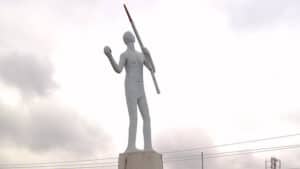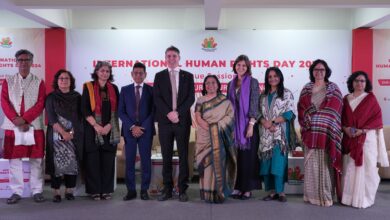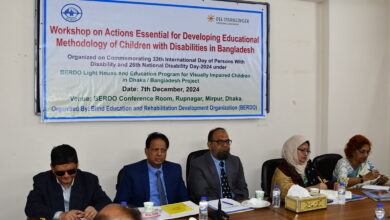‘First Armed Resistance Day’ today

March 19 is one of the most glorious days written in golden letters in the history of the Liberation War.
On this day, the country marks the first Armed Resistance Day. The fearless Bangalees resisted the Pakistani occupation forces.
Back in 1971, on March 19, by the directives of Bangabandhu Sheikh Mujibur Rahman on March 2 and the historic speech of Bangabandhu on March 7, a group of Bangalees, ignited with the spirit of nationalism, launched the first armed resistance against Pakistan military forces at Joydebpur of the district.
It was the first day when a group of freedom-loving people from all walks of life got united to raise barricades against the Pakistani occupation forces.

The group was indomitable. Even after witnessing the mass atrocities perpetrated by the Pakistani army, they did not flee away.
They snatched away arms and ammunition from the Pakistani forces. They built barricades by falling trees, putting stones and sandbags on the roads.
On secret information, from the Bangalee soldiers, of the advancement of Pakistani Brigadier Zahan Zeb Abrar Khan towards Second East Bengal regiment based at Joydevpur Rajbari to disarm the Bangalee soldiers, the people of Gazipur began to mobilise for resistance.
The Pakistani troops reached Joydevpur Rajbari at around 1pm. During then, Commanding Officer Lt. Col. Masudul Haq, Second-in-Command Major Shafiullah, Major Mainul Hossain Chowdhury (later Major General) played vital role in the historic resistance in Gazipur.
The day is observed with heavy heart as, on this very day, Shaheed Niamat, Manu Miah, and Hurmat Ali and Kanu Mia embraced martyrdom valiantly when the brute Pakistani troops opened fire on them.
Among others, the most remarkable leaders of the Armed Resistance Day were late Abdul Hakaim Master, former member of parliament (MP), late Habibullah, late Ahasnullah Master, Kazi Mozammel Haque, AKM Mozzem Haque, minister for Liberation War Affairs, Nurul Islam Master, Bhawal Ratna, Abdul Mottalab, labour leader, Naznrul Islam Khan, late Kazi Azim Uddin Master, Abdus Sattar Miah, Nurul Anowar, Shahidullah Bacchu, Dr Nazim Uddin Ahmmed. Abdul latif Gazi, Abdul Mannan, Sabdar Ali Master, Sahidul Islam Phathan, Huroon-ur-Rashid Bhuiyan, and Abul Hossain.
On March 29, bombs were hurled and firing stared from air in different places of Gazipur, and later the area was occupied by the Pakistani forces.
Afterwards, the patriotic political leaders and activists went to India through different routes to take training for participating in the Liberation War.
After taking training, the freedom fighters (FFs) launched attacks in different places of the district. By November, Muki Bahinee intensified their activities in this area.
At that time, they created panic among the occupation forces with the sniper attacks, damaging various bridges, culverts and electrics poles.
Three FFs launched attacks on Pakistani forces in Pubail, Haidarabad Bridge, Joydebpur, Rajbari and Gazariban areas of Rajendrapur, Ordnance Depot, Arms Factory and others places.
The FFs also attacked the Joydebpur Rajbari Cantonment on the nights of the December 11 and 12. After the heavy attacks at nights, the morale of the occupation forces had broken down.
The demoralised Pakistani force retreated towards Pubail following the attacks by the FFs.
On December 13, many Pakistani troops were either killed or injured as the FFs hurled bombs on train packed with army near Pubail.
The Mukti Bahini launched massive attack on the Rajbari Camp of the Pakistani troops on the nights of December 13 and 14. After failing to face the massive attacks of the Freedom Fighters, the occupation troops in plain clothes left Rajbari for Dhaka.
Returning Pakistani army from northern frontier Jamalpur, Seherpur, Mymensingh and Tangail assembled at Joydebpur in Chandana Square.
On December 14 evening, Freedom Fighters along with allied Indian forces launched operation on the armed vehicles of the Pakistani troops.
The heavy battle continued in Gazipur the whole night. The FFs and allied forces based in Kasimpur, also destroyed the arms, ammunition, tanks and transports of the Pakistani army by firing motors and canons.
In Chhoydana Village, locals killed many Pakistani troops.
During the frontal battle, freedom fighters Sharafat Ali, Badruzaaman Khokon, Jashimuddin, Mohammad Majed, Nizamuddin, Abdus Salam, Galib Hosian, Khorshed Alam, Gomej and Labbi embraced martyrdom.
Many unnamed FFs also embraced martyrdom at this battle in Gazipur.
Gazipur was at last liberated from the hands of the occupation forces after the last battle on December 15. Just one day ahead of the Victory Day.
The Day’ will be observed in a befitting manner through various programmes in Gazipur and the capital city today.





